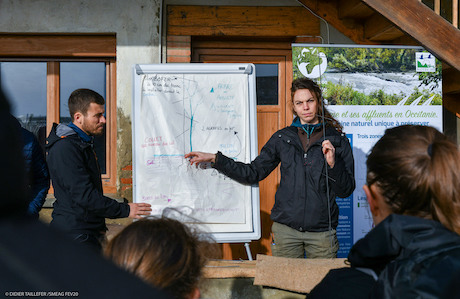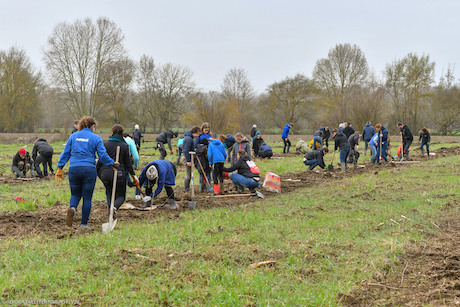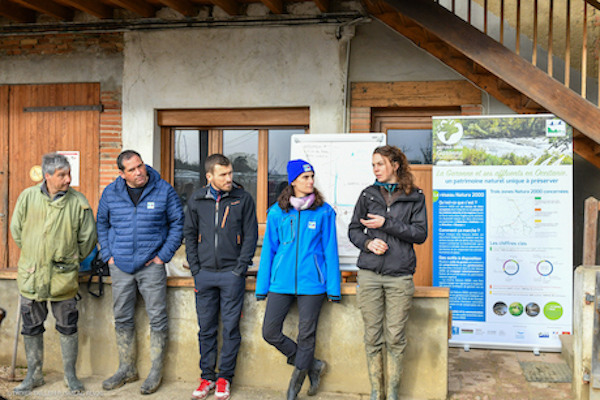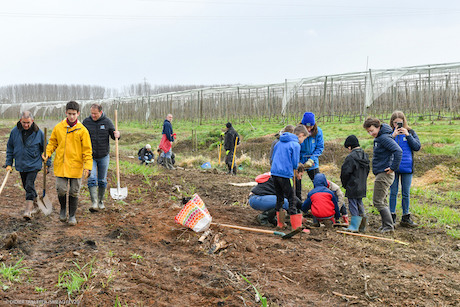Benoît Laforgue, a grower located between Grisolles and Verdun-sur-Garonne and member of the Union of Blue Whale Cooperatives, has just planted 1,200 trees and shrubs on a 4-ha plot separating his orchards from the Garonne.
The goal? To participate in the development of a rich biodiversity included in the European network Natura 2000.
The planting was carried out in the form of a collaborative project, with the help of some 30 employees of Blue Whale, and about 30 volunteers from the “Campagnes Vivantes”, WWF and “Nature en Occitanie” organizations.
 Photo: Didier Taillefer
Photo: Didier Taillefer
Objectives of the planting of local species:
- Restore the Garonne riparian forest and natural environment for the development of species of European interest targeted by the birds directive, like the Black Milan or Heron.
- Attract a diverse fauna (auxiliary insects, birds, small mammals…)
- Recreate a green traffic corridor for certain species on the territory, between natural and cultivated areas.
- Reduce the impact of floods of the Garonne river.
- Fight against soil erosion
 Photo: Didier Taillefer
Photo: Didier Taillefer
The fruit of a partnership
With the support of Blue Whale of which he is a member, Benoît Laforgue has been in contact since early 2017 with the Technical Assistance Unit for the Management of Wetlands in the Garonne (CATeZH), and the naturalist association Nature Midi-Pyrénées (now Nature en Occitanie). This enables him to get a better understanding of the land around his farm and to benefit from advice to better manage his facilities.
Between April and July 2017, three ecologists took turns visiting his land to observe his facilities, count the birds, insects and bats in and around the orchards. “The interest is two-fold for nature and for the protection of our orchards, since bats and insectivorous birds can reduce the codling moth and apple worm populations,” explains Benoît. “It is also interesting to provide refuge for wild pollinating insects in order to improve pollination.”
“This allows naturalists to compare this report with the biodiversity that is traditionally present in the region and in the wetlands especially, in order to then propose courses of action. This way, we will have a benchmark of the level of biodiversity in 2017 and we will be able to redo this inventory in a few years to measure the impact of the established improvements. The other goal is to improve what ecologists in their jargon call ‘ecological connections’, which means to ensure that the rupture created by cultivated areas does not prevent the circulation of certain species between refuge, feeding and breeding areas,” explains Emmanuelle Terrien.
 Paul Simon, facilitator in Tarn-et-Garonne and coordinator for the Garonne and its affluents in Occitanie, Benoît Laforgue Blue Whale producer, Thomas Matarin of Nature en Occitanie, Emmanuelle Terrien quality engineer at Blue Whale and Zoé Jubineau of Campagne Vivante 82 - Photo: Dider Taillefer
Paul Simon, facilitator in Tarn-et-Garonne and coordinator for the Garonne and its affluents in Occitanie, Benoît Laforgue Blue Whale producer, Thomas Matarin of Nature en Occitanie, Emmanuelle Terrien quality engineer at Blue Whale and Zoé Jubineau of Campagne Vivante 82 - Photo: Dider Taillefer
The experts were able to appreciate the old isolated trees preserved, the woods along the Garonnette, the grass growing in the orchards, the wild bushes, and especially the presence of a water point, true nourishing zone at the heart of the farm. A course of action was then established.
In the winter of 2019, he replaced a coniferous hedge with a hedge of 500m of local species (hornbeam, dogwood, lilac, small-leaved linden, phillyrea, buckthorn, privet, laurustine…) around his orchards. The adventure continues with the planting of 1,200 trees and shrubs on a 4-ha plot separating the Garonne orchards.
“This operation financed by Europe and the French government is one of the first contracts signed since the relaunch of the Natura 2000 system on the Garonne,” explains Paul Simon, facilitator in Tarn-et-Garonne and coordinator for the Garonne and its affiliates in Occitanie.
The organization Campagnes Vivantes 82, specialist in rural hedges in Tarn-et-Garonne, helped the producer in the choice and supply of local species. It also advised him on the technical protocols to prepare the soil and plant. Biodegradable mulching and a protection against predatory deer were put in place to ensure the best possible conditions for the young plants to grow.

Photo: Didier Taillefer
Other fruit growers have taken to it as well
In 2019, 2 new Blue Whale farms benefited from a biodiversity diagnosis. And in 2020, 6 other fruit growers will open their doors to naturalists to exchange skills and obtain an ecological and functional diagnosis.
For more information:
Dina Abella
Blue Whale
1205 Avenue de Falguières BP 417
82004 Montauban Cedex – France
Phone: +33 (0)5 63 21 56 56
Dina@blue-whale.com
www.blue-whale.com
